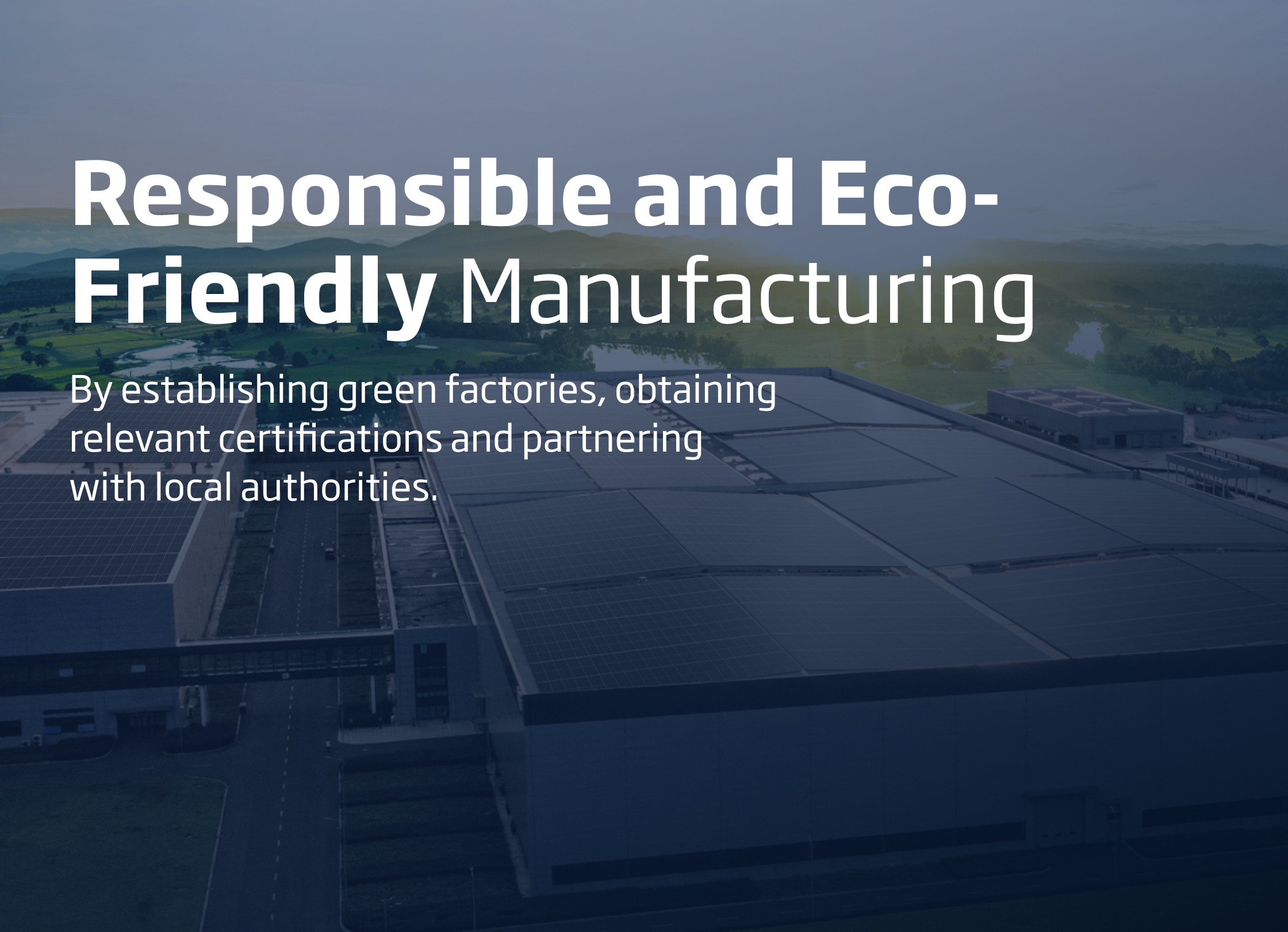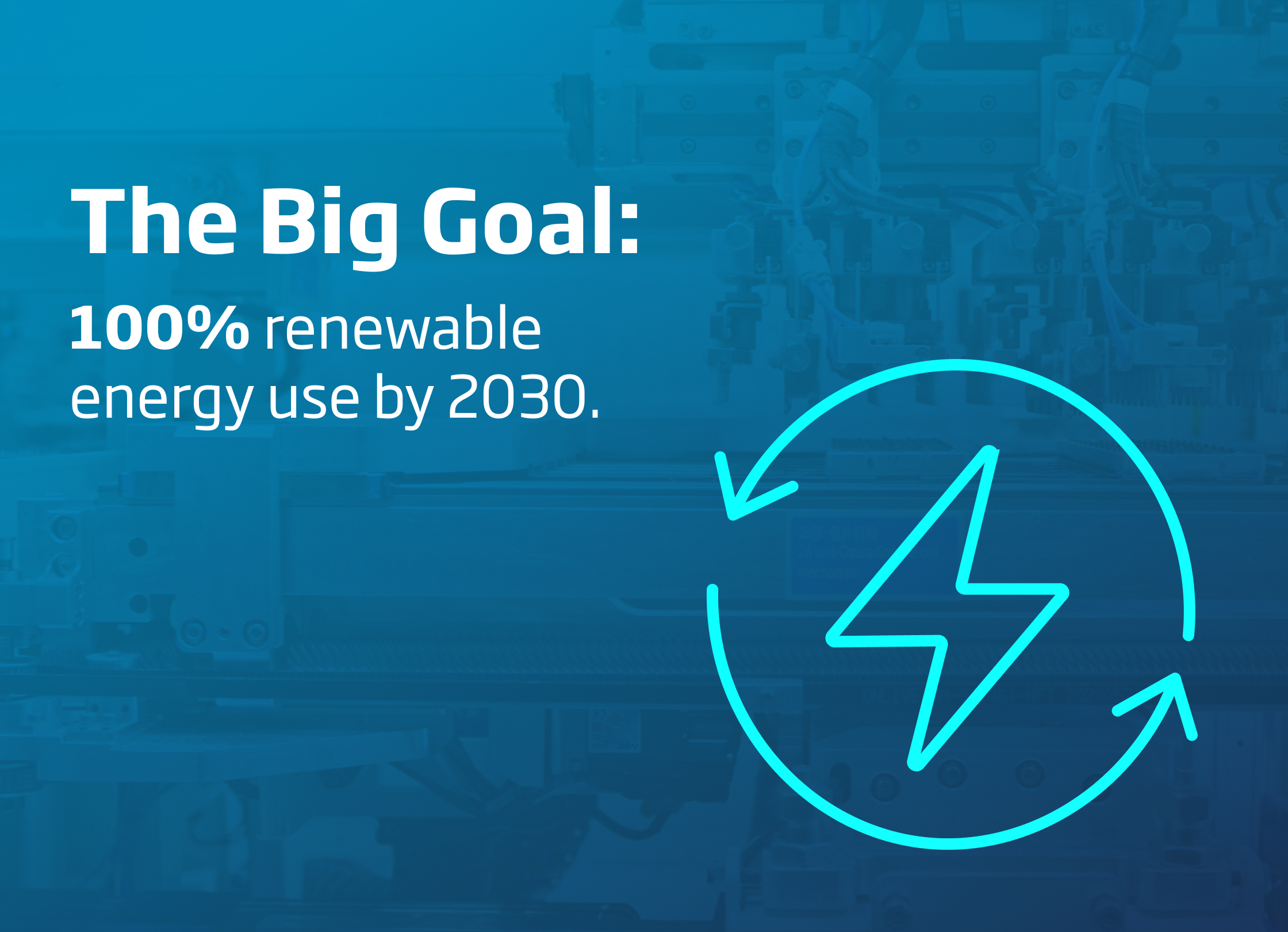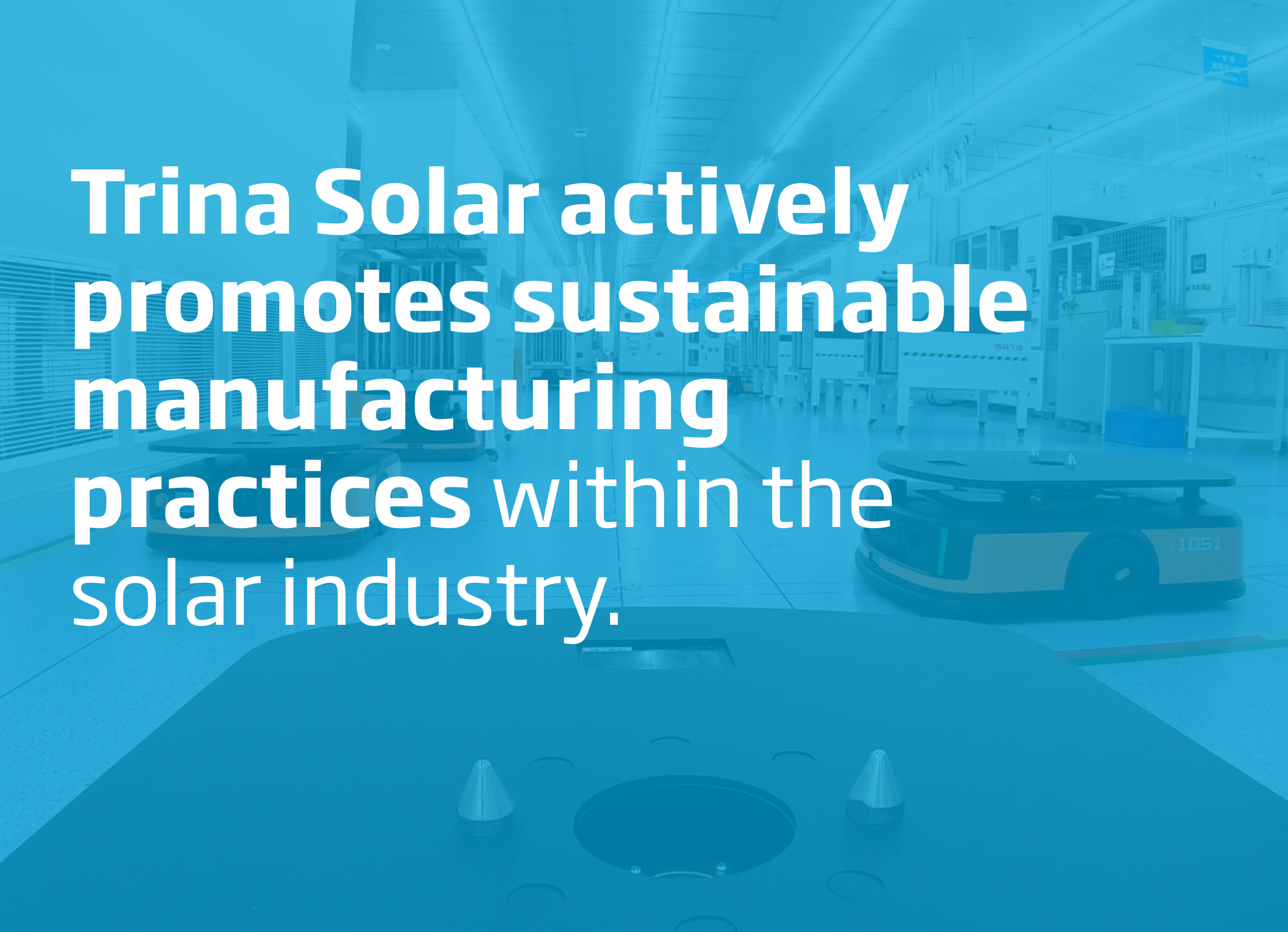Smart and sustainable manufacturing in the solar industry
- 23/10/23
- Business of Solar,Industry News,Responsible Earth
Decarbonizing the solar industry has become crucial as the world races toward a greener future. Committed to environmental conservation, Trina Solar strives to adopt sustainable manufacturing practices that reduce its operational carbon footprint.
Dedicated to innovation, Trina Solar has invested substantially in smart manufacturing operations. By integrating advanced technologies and sustainable processes, the company drives efficiency and leads the charge in decarbonizing the solar industry.
Below, we provide insight into Trina Solar's revolutionary smart and sustainable manufacturing approach. We’ll also explore visionary initiatives, super factories, and smart production processes.
Promoting Sustainable Manufacturing
Trina Solar actively promotes sustainable manufacturing practices within the solar industry. The company ensures industrial carbon emission reduction by implementing these eco-friendly strategies and optimizing resource utilization.
Establishing an EHS Committee
Trina Solar established its EHS (Environmental, Health, and Safety) committee in 2009 in line with its dedication to decarbonizing the solar industry. This committee drives the company's sustainability initiatives, ensuring compliance with local and national environmental laws and regulations.
The EHS committee plays a critical role in overseeing Trina Solar's manufacturing processes and facilities to minimize the environmental impact. They conduct regular audits, inspections, and assessments to identify areas for improvement and implement effective measures accordingly.
Trina Solar stays up-to-date with the latest environmental regulations and best practicesby maintaining close relationships with relevant authorities and industry organizations. The company also regularly updates its organizational structure and conducts employee training to comply with new EHS laws and waste management.
In addition, Trina Solar actively participates in conferences, workshops, and collaborative initiatives. The programs foster knowledge sharing and promote sustainable manufacturing practices across the solar industry.
Trina Solar's EHS committee works closely with other departments within the organization. For instance, the EHS collaborationwith the research and development (R&D) team allows the company to integrate sustainable technologies into manufacturing processes. This teamwork promotes proper energy management and reduces environmental impact.

Establishing Green Factories
Trina Solar recognizes the importance of establishing green factories both locally and abroad. These factories adhere to an internal environment management system that meets the ISO 14001 certification.
Trina Solar's factories use environmental management manuals that serve as detailed guides for sustainable operations. They include:
-
The Environmental, Occupational Health and Safety, and Energy Management Manual
-
The Photovoltaic Project Manual
The manuals outline best practices for waste management, energy conservation, water usage, and emission control. Implementing these manuals ensures the company’s manufacturing processes align with stringent environmental standards.
In addition, Trina Solar's commitment to sustainability is reflected in implementing various environmental management systems. They include:
-
The EHS Monitoring Management Procedure
-
The EHS Management Review Procedure
-
The Construction Project EHS Management Procedure
Implementing these strategies enables our facilities to obtain certifications such as "Net Zero Factory", "Green Factory", and "Green Building".
One notable example of Trina Solar's dedication to green factories is the new Qinghai factory within a net-zero industrial park. In March 2022, Trina Solar signed a strategic cooperation agreement with the Qinghai Provincial Government to jointly build the Integrated Net Zero Industrial Park. This initiative demonstrates Trina Solar's commitment to vertical integration in module manufacturing, energy storage systems, and mounting system manufacturing.
Additionally, in 2022, Trina Solar's Yiwu Vertex Super Factory completed a self-evaluation report for green factory certification. This self-assessment showcases the facility's efforts to meet stringent environmental standards and incorporate sustainable practices into its operations. Later, in August 2022, the Yiwu production base successfully completed a third-party evaluation report for Green Factory certification by TiGroup, an EHS certification body, further validating its commitment to sustainable manufacturing. The site is the first factory in the PV industry to be awarded zero carbon status by an independent agency.
Trina Solar sets the pace for responsible and eco-friendly manufacturing in the solar industry by establishing green factories, obtaining relevant certifications, and partnering with local authorities.
Energy Consumption Management
Trina Solar recognizes the critical role of energy conservation in its pursuit of smart and sustainable manufacturing. To ensure efficient resource utilization, the company implements several internal regulations like
-
the Energy Measurement and Management Procedure
-
the Energy & Resource Management Procedure
-
the Energy Review Procedure
The procedures provide guidelines for energy conservation across our different manufacturing facilities.
Trina Solar has obtained ISO certifications that validate its efforts in line with its energy management commitment. In 2015, the British Standards Institution (BSI) issued the company the ISO 50001 Energy Management System Certification. This certification recognizes Trina Solar's adherence to internationally recognized standards for energy management.

Setting and Achieving Energy Conservation Targets
Trina Solar is dedicated to setting and achieving ambitious energy conservation targets as part of its commitment to sustainable manufacturing. By establishing these targets, the company aims to drive significant reductions in energy consumption and promote using renewable energy sources. With 2020 as our base year, here are some of the targets we’ve set to achieve:
-
By 2025: 40% reduction in the integrated power consumption in manufacturing per MW of solar PV modules
-
By 2025: 40% reduction in the integrated power consumption per unit output of solar cells
-
By 2030: Achieve 100% renewable energy use in global operations and production
-
Save 100 million kWh of energy consumption in our worldwide operations and manufacturing between 2021-2030
Trina Solar has achieved remarkable milestones in its energy conservation and sustainability pursuit. After implementing several measures, the company has made significant progress toward its energy conservation targets.
Using 2020 as our baseline year, some of our achievements by the 2022 reporting period include:
-
The energy intensity for cell products was reduced to 5.55 tons of standard coal per MW, representing a notable decrease of 54.21%.
-
Reaching an energy intensity of 1.96 tons of standard coal per MW for module products, reflecting a significant reduction of 41.60%.
Furthermore, Trina Solar has realized substantial energy savings by implementing various strategies. Through the optimization of process flows and the installation of energy-saving equipment, the company has:
-
Saved an impressive total of 44,960,300 kWh of electricity consumption since 2021..
-
Saved a total of 35,835,300 kWh of electricity consumption in 2022.
These accomplishments highlight the company's proactive efforts to enhance energy efficiency and reduce its environmental impact.
The big goal: 100% renewable energy use by 2030
In addition to supplying renewable photovoltaic products, Trina Solar also prioritizes using renewable electricity in its manufacturing processes. Integrating renewable energy sources into our operations showcases our commitment to decarbonizing the solar industry.
Our super factories reduce reliance on conventional energy sources by installing rooftop solar panels in spare roof spaces. Additionally, we feed any excess electric energy generated into the local power grid, further contributing to the clean energy ecosystem.
In 2022, Trina Solar made substantial progress in renewable energy utilization. The company utilized 56,203 MWh of renewable power from PV energy generation. Out of this, the Yiwu super factory accounts for 49,978 MWh. Meanwhile, the Suqian super factory used 2,000 MWh of clean energy. These figures demonstrate Trina Solar's commitment to achieving the goal of 100% renewable energy usage in its global production operations by 2030.

Sustainable Construction of Solar Power Stations and Manufacturing Facilities
Trina Solar greatly emphasizes sustainable construction practices when establishing solar power stations and manufacturing factories. The company is committed to adhering strictly to relevant environmental regulations to ensure responsible and eco-friendly operations.
The site selection process for power stations begins with conducting comprehensive environmental impact assessments. Trina Solar evaluates the potential environmental effects by considering factors such as air quality, biodiversity, and land use. By conducting these assessments, the company aims to minimize the ecological footprint of its power stations.
In addition, Trina Solar carefully considers local water resource availability during site selection. The company recognizes the importance of responsible water management and strives to minimize water usage and promote conservation. We ensure sustainable water usage throughout our operations by selecting sites with access to adequate water resources and implementing efficient water management systems.
Overall, we incorporate sustainable construction practices and adhere to green building principles throughout the construction process. These practices include:
-
Optimizing energy efficiency in building design
-
Utilizing eco-friendly materials
-
Implementing waste management strategies
By prioritizing sustainable construction, Trina Solar reduces the environmental impact of its manufacturing factories and solar power stations.
Smart Manufacturing
Trina Solar is dedicated to smart manufacturing practices that improve customer value. We can enhance efficiency and deliver exceptional products by intelligently transforming various aspects of our operations, including sales, R&D, and maintenance.
Trina Solar embraces several digital systems to optimize the manufacturing process. They include
-
Production execution system (PES)
-
Production traceability data system
-
Quality management system (QMS)
-
Equipment IOT system (RFID)
-
The use of intelligent hardware such as automatic guided vehicles (AGV)
These digital systems enable real-time monitoring, data analysis, and predictive maintenance. They allow for proactive decision-making and continuous improvement.
Trina Solar has also invested in developing a PV industrial internet platform. This platform integrates data across the value chain, facilitating seamless communication and department collaboration.
Furthermore, Trina Solar fully relies on automated production lines. These advanced systems enable efficient and precise manufacturing processes, reducing human error and enhancing productivity. By implementing smart manufacturing strategies, Trina Solar can achieve greater operational flexibility and scalability, meeting the evolving demands of the solar industry.
Driving Sustainability in the PV Industry
Trina Solar is taking the initiative in decarbonizing the solar industry through smart and sustainable manufacturing practices. We are revolutionizing how solar products are manufactured by investing in advanced technologies, adhering to environmental regulations, and setting ambitious energy conservation targets. Stay informed about the latest green energy developments, and let's work together towards a more sustainable future for generations to come.


